Publications
IfM Bonn publishes its research findings primarily in its publication series: study results are published as "IfM-Materials" - or in condensed form as a "Denkpapier" (summary). Statistical analyses and results appear in the series "Daten und Fakten". Discussion and technical papers from all research areas are published as "Working Papers".
In addition, until 2012 selected articles were published in the series "Schriften zur Mittelstandsforschung" (Gabler Verlag). Under the "External Publications" tab, you find numerous essays by IfM researchers that have appeared in (peer-reviewed) specialist journals and external publication series.
552 Results
External publication | 2025 Bureaucracy costs of companies in the mechanical and plant engineering industries – follow-up study 2025
This study analyses the bureaucratic burden caused by regulations of the EU, central government, federal states and municipalities in the German machinery and equipment manufacturing industry.
External publication | 2025 European SMEs, Corporate Finance, and Economic Resilience to Floods
The authors investigate how the debt-to-equity ratio and maturity structure of SMEs influence their resilience to flood disasters.
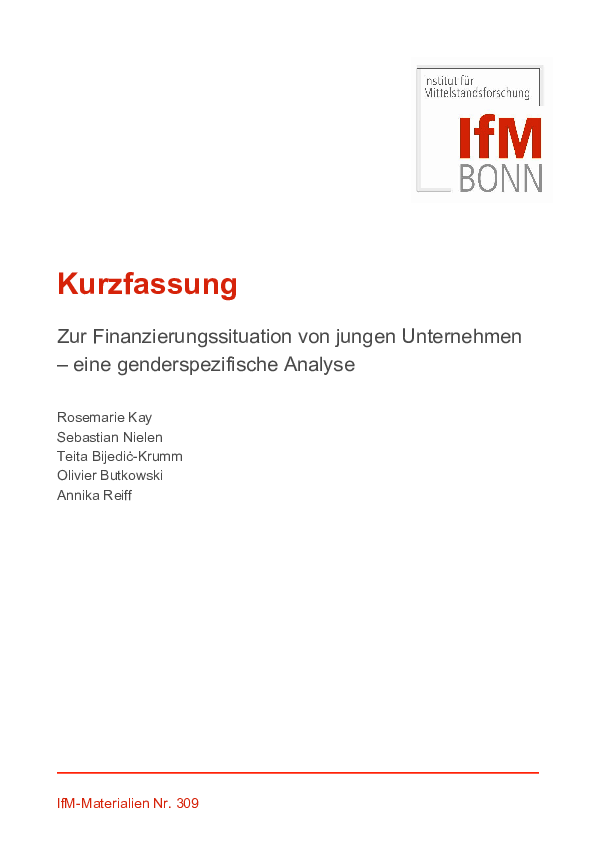
IfM-Materialien | 2025 The financing situation of young businesses - a gender specific analysis
The authors analyse in their publication the question, if the use of some sources of financing depends on whether the management of a young business is female.
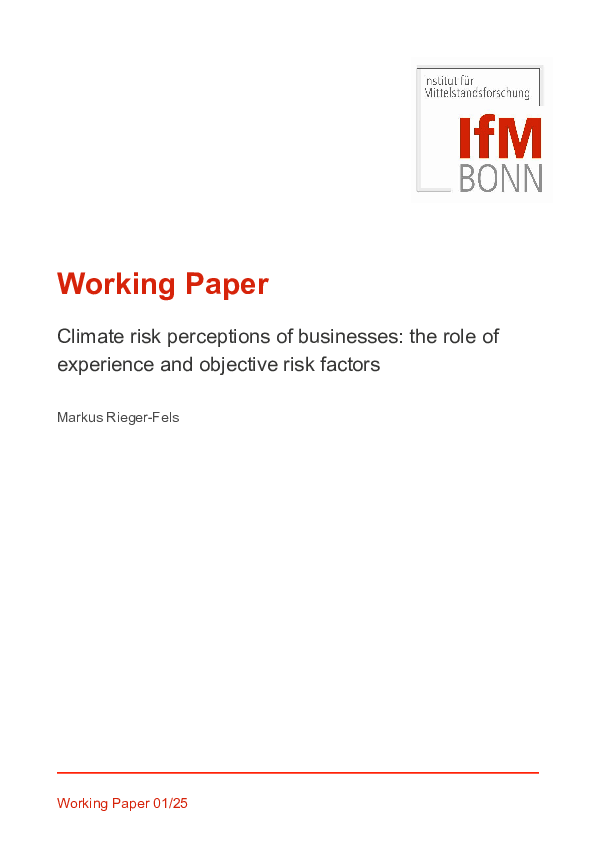
Working Papers | 2025 Climate risk perceptions of businesses: the role of experience and objective risk factors
Based on data from a large-scale survey of German businesses, it is investigated how businesses assess the acute physical climate risk presented by the increased frequency of natural hazards: droughts, storms, extreme heat, heavy precipitation, and floods.

IfM-Materialien | 2025 Practice checks - an effective instrument for reducing bureaucratic burdens?
Companies have long complained about many regulations' lack of proportionality and practicability.
External publication | 2025 Public childcare – a neglected element of entrepreneurship ecosystems?
The authors explore in their chapter the impact of public childcare provision on women’s and men’s start-up activities in Germany.
External publication | 2025 Legitimacy of women entrepreneurs: forced to behave according to rules?
The authors analyse in their contribution whether female entrepreneurs behave strategically differently to their male counterparts when dealing with bureaucracy.
External publication | 2025 How women-led businesses fared in the Covid-19 pandemic
Have women-led businesses been more impaired by the coronavirus pandemic than men-led businesses? Did female entrepreneurs use support measures to the same extent as their male counterparts?
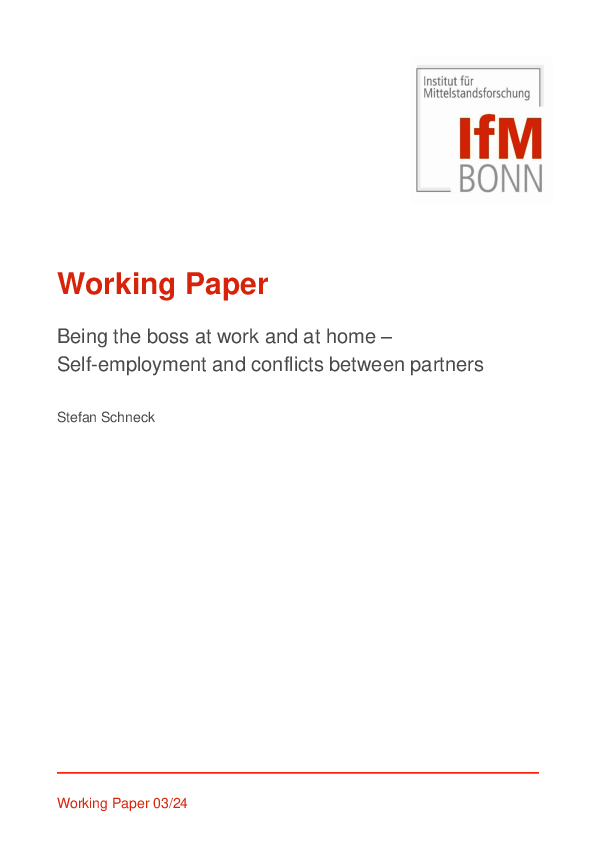
Working Papers | 2024 Being the boss at work and at home – Self-employment and conflicts between partners
The self-employed are their own bosses and make independent decisions on how to achieve their goals
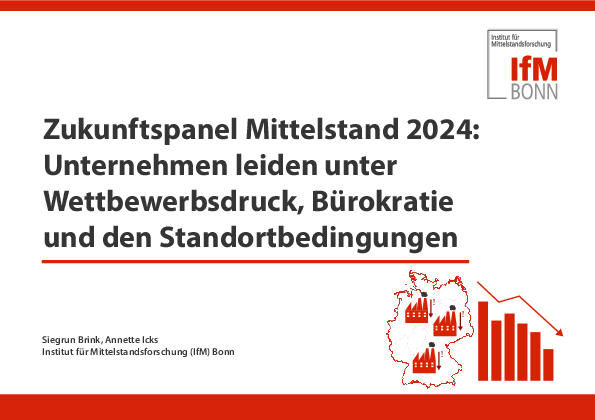
Chartbooks | 2024 Mittelstand Future Panel 2024: Companies struggle with competitive pressure, bureaucracy and business conditions
The IfM Bonn researchers asked again company managers to take part in the Future Panel Mittelstand in 2024.

IfM-Materialien | 2024 The bureaucratic barriers for SMEs in the construction sector as a result of their participation in public procurement
Participation in public tenders at municipal level is associated with bureaucratic burdens.
External publication | 2024 The equity crowdfunding choice: A demand-side perspective
In recent years, equity crowdfunding has become increasingly popular for capital-seeking start-ups.

IfM-Materialien | 2024 Entrepreneurial ecosystems and start-up activity – a long-term analysis of their interrelationships
Supporting start-up activity is a central goal of regional economic policy. The focus here is on regional start-up ecosystems, which combine many potential influencing factors.
External publication | 2024 Determinants of Hidden Champions
This study explores the factors that affect the likelihood of German companies to be a hidden champion.
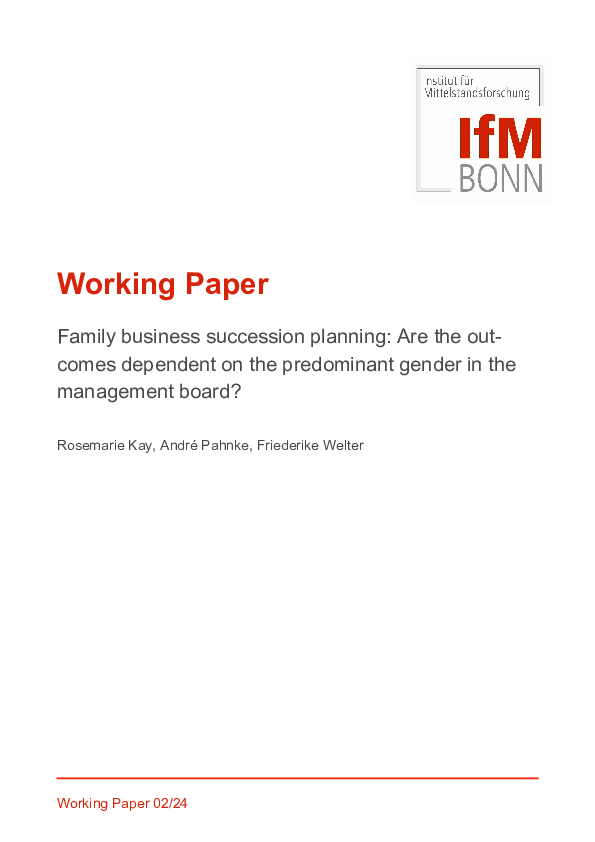
Working Papers | 2024 Family business succession planning: Are the outcomes dependent on the predominant gender in the management board?
While existing research on business successions stresses the importance of the economic situation of family business in this context, research on women’s entrepreneurship, however, suggests that women-led businesses may be less economically attractive for potential successors because of structural differences in comparison to men-led business.

Policy Brief "Entrepreneurship in Focus" | 2024 Financed maternity benefits for self-employed women?
Self-employed women may voluntarily insure themselves through their health insurance against a loss of earnings during the maternity protection period.
External publication | 2024 Legitimacy of women entrepreneurs: forced to behave according to rules?
Legitimacy is essential to ensure the continued existence of companies. Depending on whether stakeholders consider entrepreneurs’ behavior to be appropriate, they decide whether to provide entrepreneurs with resources.
External publication | 2024 How women-led businesses fared in the Covid-19 pandemic
The authors investigate how female-led businesses were impaired by the Covid-19 pandemic, to what extent they used support measures, and what operational measures they took to counter the consequences of the pandemic.
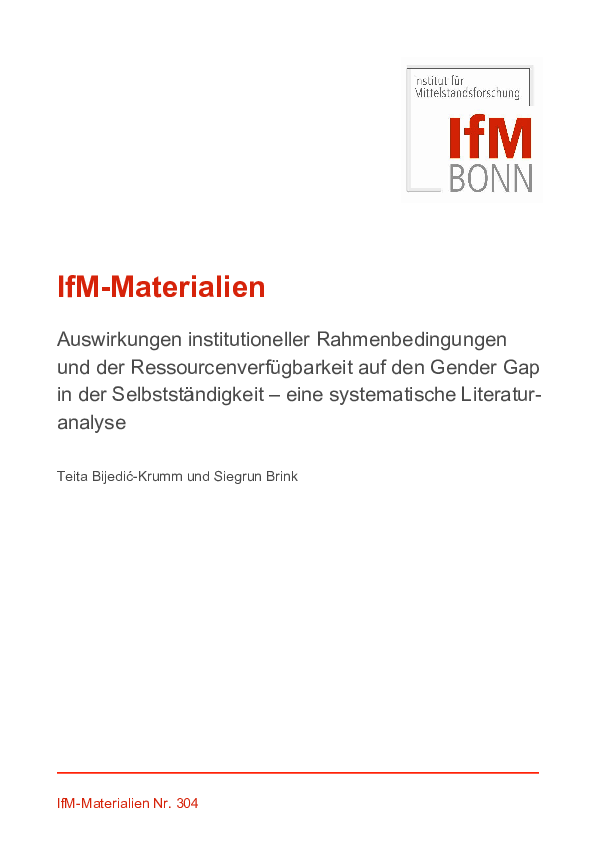
IfM-Materialien | 2024 Effects of institutional framework conditions and resource availability on the gender gap in self-employment – a systematic literature analysis
This study uses a systematic literature review of international publications to examine the effects of institutional framework conditions and the availability of resources on the gender gap in entrepreneurship.

Facts and figures | 2024 Maternity benefits for self-employed women
Self-employed women can voluntarily insure themselves against loss of income during the maternity protection period through health insurance. Around half of self-employed women of childbearing age are insured accordingly.